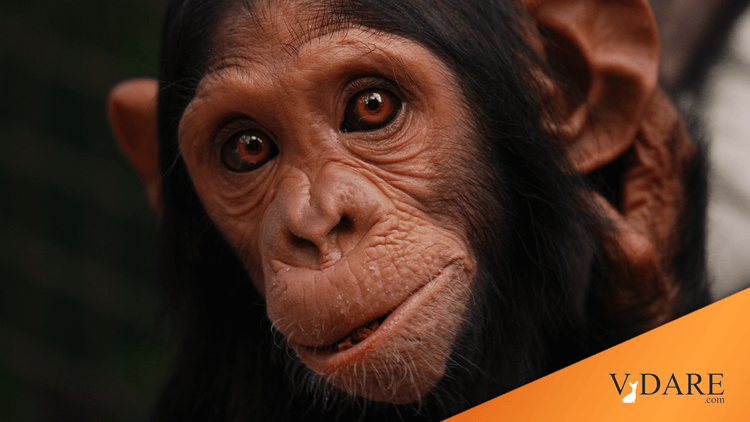
By Steve Sailer
03/11/2011
Nicholas Wade reports in the NYT:
New View of How Humans Moved Away From Apes
Anthropologists studying living hunter-gatherers have radically revised their view of how early human societies were structured, a shift that yields new insights into how humans evolved away from apes.
Early human groups, according to the new view, would have been more cooperative and willing to learn from one another than the chimpanzees from which human ancestors split about five million years ago. The advantages of cooperation and social learning then propelled the incipient human groups along a different evolutionary path.Anthropologists have assumed until now that hunter-gatherer bands consist of people fairly closely related to one another, much as chimpanzee groups do, and that kinship is a main motive for cooperation within the group. Natural selection, which usually promotes only selfish behavior, can reward this kind of cooperative behavior, called kin selection, because relatives contain many of the same genes.
A team of anthropologists led by Kim S. Hill of Arizona State University and Robert S. Walker of the University of Missouri analyzed data from 32 living hunter-gatherer peoples and found that the members of a band are not highly related. Fewer than 10 percent of people in a typical band are close relatives, meaning parents, children or siblings, they report in Friday’s issue of Science.
Michael Tomasello, a psychologist at the Max Planck Institute for Evolutionary Anthropology in Germany, said the survey provided a strong foundation for the view that cooperative behavior, as distinct from the fierce aggression between chimp groups, was the turning point that shaped human evolution. If kin selection was much weaker than thought, Dr. Tomasello said, "then other factors like reciprocity and safeguarding one’s reputation have to be stronger to make cooperation work."
The finding corroborates an influential new view of early human origins advanced by Bernard Chapais, a primatologist at the University of Montreal, in his book "Primeval Kinship" (2008). Dr. Chapais showed how a simple development, the emergence of a pair bond between male and female, would have allowed people to recognize their relatives, something chimps can do only to a limited extent. When family members dispersed to other bands, they would be recognized and neighboring bands would cooperate instead of fighting to the death as chimp groups do.
So, the evolution of pair-bonding or higher intelligence or whatever allowed our ancestors to remember who their kin were, even if they had gone off to other tribes. After awhile, we could, no doubt, recognize more distant kin, and even our in-laws, too, and then the kin of our in-laws and other refinements. And then, as we got even smarter, we'd start paying attention to people who might be, say, our children’s future in-laws.
So, would kin selection be more or less powerful under these conditions than among a bunch of chimps?
This is a content archive of VDARE.com, which Letitia James forced off of the Internet using lawfare.